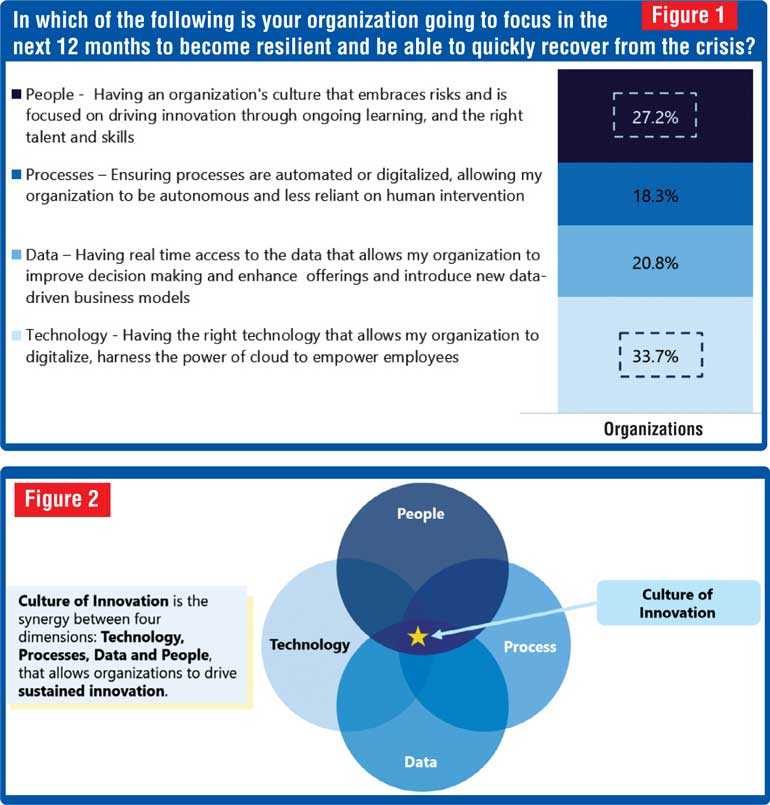Saturday Feb 07, 2026
Saturday Feb 07, 2026
Friday, 12 February 2021 00:00 - - {{hitsCtrl.values.hits}}

 As work, school, healthcare, and even social activities shifted to a remote model, organisations raced to bring people together despite lockdowns by adopting digital tools such as cloud services, mobile technology, and video-conferencing apps. Those who had the technology in place and people empowered to harness its potential in response to the crisis clearly had the advantage.
As work, school, healthcare, and even social activities shifted to a remote model, organisations raced to bring people together despite lockdowns by adopting digital tools such as cloud services, mobile technology, and video-conferencing apps. Those who had the technology in place and people empowered to harness its potential in response to the crisis clearly had the advantage.
Nearly half (48%) of organisations in the region now say they find it easier to drive innovation, compared to a quarter (27%) of them before COVID-19. These findings were released by Microsoft in its latest study with IDC Asia Pacific, which surveyed 3,312 business decision-makers and 3,495 workers across 15 markets in Asia Pacific within a six-month period, before and since COVID-19. It found that fostering an environment where continuous innovation can thrive is the key to long-term resilience and success.
The potential of people and technology
Organisations in Sri Lanka can reimagine themselves for the future by encouraging people to embrace change while integrating digital and non-digital environments to support business goals. Take AIA Insurance, Asia’s largest life insurance services group, as an example. As the pandemic spread, the company, which had already adopted Microsoft 365, quickly streamlined its day-to-day operations so employees across Sri Lanka could communicate and collaborate whilst maintaining physical distance.
When Sri Lanka’s leading on-demand mobility solution provider, PickMe, experienced a surge in server downtime and extended passenger wait times due to the increase in users, the company tapped into Microsoft Azure to gain real-time intelligence across its operations allowing them to maximise driver benefits, minimise passenger wait times, and improve the PickMe experience for customers.
The Colombo Tea e-Auction platform developed by CICRA Solutions also leverages Microsoft Azure. The platform was built to safeguard a 150-year-old industry and protect the livelihoods of almost two million people. The platform was recently selected as Sri Lanka’s Best National Digital Solution for the World Summit Awards 2020 under Business and Commerce (Innovative Services) category.
Maldivian retail chain Sonee Sports was also able to respond by rolling out Microsoft Dynamics 365 to aid in enterprise resource planning, point of sale, and customer relationship management. The company cut on-premises IT maintenance costs by 38% and improved customer retention by 8%.
These companies followed a process we call ‘tech intensity’, where tools and technologies are utilised to invent unique digital solutions that would solve complex business and market issues. This would not only empower the business to be more agile in facing new market challenges but also move faster than their competitors who did not leverage technology to their advantage.
What is the recipe for success?
Companies that prioritise an innovative workplace culture are more optimistic in terms of growth and have employees who are happier and more engaged. However, the success of hybrid and remote teams goes beyond having the right technology tools. Here are four steps business leaders can take to support their teams.
Embracing change
Yes, having the appropriate tech is essential – but when it comes to unlocking innovation, ensuring people feel connected and collaborative is just as important. Innovation is fuelled when workers feel empowered to take smart risks and to exchange ideas with different people.
So, the challenge for businesses is to ensure the sense of comradery, unity and psychological safety that comes naturally when people are sat together every day in the same location is ported across to teams that are now working in a more hybrid way.
While we are in a time of uncertainty as the world looks to emerge from the health crisis, there’s one thing that is certain: the creativity and tenacity of Sri Lanka’s workforce will be instrumental in supporting the recovery and shaping a whole new approach to how business gets done.
(The writer is Country Manager, Microsoft Sri Lanka and Maldives.)